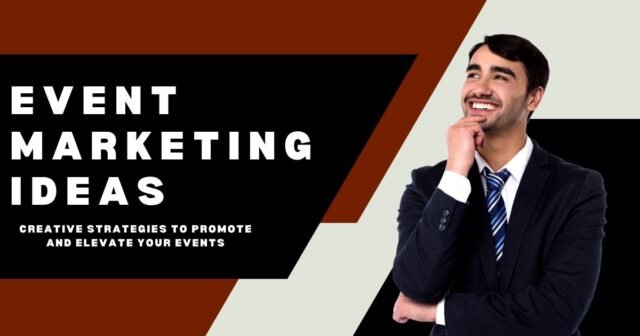An event is a fantastic way to nurture a deeper personal relationship with your audience and generate more brand exposure. Workshops, large conferences, and even virtual webinars can speak to your audience in a special way. But how do you make sure your event provides a good return on your investment (ROI)? This blog aims to provide you with actionable event marketing ideas that let you reach your goals, engage your target group, and expand your brand.
The Power of Event Marketing
Events are so much more than meetings or presentations. They offer a chance to turn leads into customers, build relationships with colleagues, and even prove your authority in your field. And a recent poll found 95% of marketers believe they offer attendees valuable in-person interaction. And successful event marketing can raise brand awareness, generate leads, and drive revenue.
With a great plan and some creative event marketing ideas, you can deliver these experiences for your attendees. Here are the steps to creating a highly memorable event marketing campaign.

Setting Clear Objectives
From purpose comes powerful action and every great event has purpose at the heart of it. With these objectives in place, you can measure progress and make sure that what you’re doing lines up with your overall business principles.
Why Objectives Matter
Your event goals are ultimately the building blocks for all of your marketing efforts, allowing you to get laser focused in your priorities and spending. Do you want to promote a new product, generate a list of leads, create goodwill in your community, or gather invaluable insights into what your customer wants? Your goal needs to be defined, and it will shape everything else.
Pro Tip:
a. Employ the SMART (Specific, Measurable, Achievable, Relevant, Time-bound) package when you’re establishing the event goals:
-
Specific
-
Measurable
-
Attainable
-
Relevant
-
Time-bound
Try going with something like: Instead of “Get more exposure” Aim for “Generate 500 new qualified leads at this event this Q2”.
Know Your Audience
It is the soul of your event. In order to make sure that you have the power to be the one they pick to do business with, you need to be aware of their wants, their needs and their problems.
Researching Your Audience
Leverage your analytics tools, online customer surveys and feedback from past events to learn more about your would-be attendees. Consider factors such as:
-
Age, Location, and Interests (demographics)
-
The nature of the work and the voice in decision-making process
-
Issues or trends in their industry that they usually face or care about
Customizing the Experience
Customize your content and the format of your event to solve a problem for your attendees. For example, if the event attendees you want to attract are small business owners, they’ll likely value actionable takeaways and being able to network in order to expand their community of business contacts.
Deciding on the Best Format for Your Event
The way you structure your event can be key to its success. In a world with so many choices, the best way to tell your story is creatively and in a way that speaks to your desires.
Common Event Types to Consider:
-
Webinars and Virtual Events: Perfect for reaching a global audience at a fraction of the cost. Platforms such as Zoom, Hopin and Google Meet make interacting with online participants easier than ever.
-
Workshops & Training: Offer anything that is hands-on, and provides as much value to the attendee as physically possible for solving a particular problem that they have.
-
Pop-up Events Discover the power of Surprise: These events are ideal for brands who would like to test new business concepts in an innovative environment.
-
Conferences & Trade Shows: Larger industry conferences are a chance to position your company as an industry influencer.
-
Hybrid Events: Connecting the physical and the digital audiences can grow the event’s footfall and still feel personalized.
Matching Format to Audience
Consider the time, place, and learning styles of your audience. For instance, audiences that are very tech-savvy might love to engage in interactive demos in a webinar, while creative audiences might enjoy in-person workshops.
Leveraging Social Media
New social media is really a game changer in marketing events. It’s where your attendees spend the most time, so it is a no-brainer when it comes to creating buzz before, during, and after the event.
Pre-Event Promotion
Begin early by generating a hashtag for an event and sending teasers out on the web. Share behind-the-scene content, countdown reminders and testimonials from previous attendees. And don’t overlook sending compelling invites through email and LinkedIn!
Tools to Use:
Tools such as Instagram Stories, Facebook Events and Eventbrite allow you to easily distribute updates and invites.
Live Coverage
Connect with remote spectators to your event by live streaming important aspects of it. Leverage Twitter polls, interactive Q&A segments and IG Live stories to create excitement in the moment.
Post-Event Engagement
The celebration doesn’t stop when the last guest goes. Post highlight reels, shout out attendees, and share testimonials/reviews. Tell your guests to use your event hashtag when sharing their own photos and experiences.
Measuring Success and ROI
You’ve put a lot time, effort, and imagination into your event marketing plan. To do that effectively, you need to measure.
Key Metrics to Track
-
Attendance Figures: Look at how many people showed up compared to how many RSVP’d or purchased a ticket.
-
Engagement Rates: Review of post-event surveys, social media comments and post-event mentions.
-
Lead Generation: Record the number of leads or customers – past or future – that your attendees became during or after the event.
-
Return on Investment (ROI): Compare the income the added value produces with all expenditure.
Follow-Up is Key
Follow-up emails after events are essential in carrying on the momentum. Send exclusive event content, invitations to future events, or a survey for feedback.
Event Marketing Ideas Are What Drives the Future for Engagement
Event marketing is a vital part of any marketer’s playbook. By setting clear goals, knowing your audience inside and out, using social media as part of a strategy and tracking results with data, you can effectively make your next event ready to capture attention — and deliver.
Searching for even more inspiration for your campaigns? Whether you’re a seasoned pro or trying to implement your first marketing strategy, good advice can elevate your approach to events. Sign up for our newsletter for expert advice, personalized recipes and live coverage.
As a blogger, your online reputation can impact your audience trust and growth. For a step-by-step approach to managing your digital presence, read How to Manage Your Online Reputation as a Blogger: A Complete Guide.









